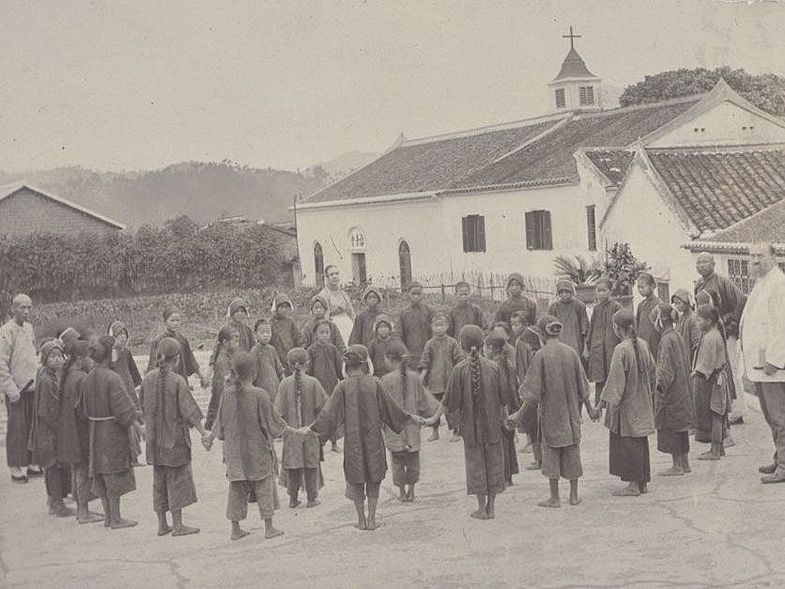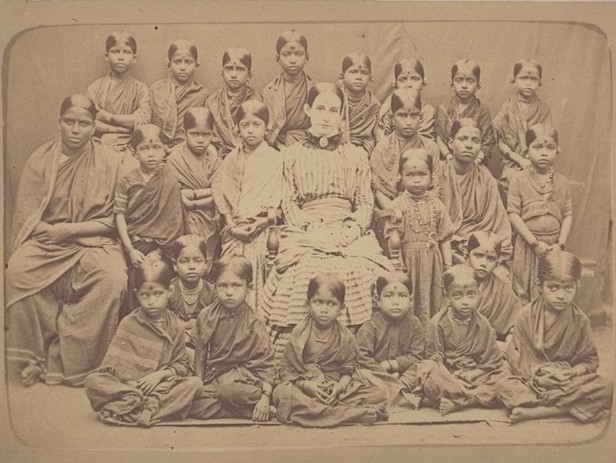"China is now really opened, which was not so when Gützlaff wrote: China opened." These words of enthusiasm were sent by missionary Philipp Winnes to his superiors in Basel in 1858. The reason for this enthusiasm was the adoption of the Tianjin treaties. At last, Winnes said, China was "open," unrestricted missionary activity was now to be permitted in China, under the military protection of colonial armies. These would intervene should missionaries be attacked by bandits or harassed by officials. Philip Winnes, who worked as a missionary in China from 1852-65, expressed relief based on his own experience: only a few years earlier, he had had to enlist the help of British soldiers to be rescued from the hands of local bandits at his home in Pukak, in the southern Chinese interior.
"Century of humiliation"
The Treaties of Tianjin belong to the "unequal treaties". These had been imposed on China by the colonial powers in the 19th century. Even today, they are seen as the epitome of China's humiliation during a period of political weakness as the Qing Dynasty neared its end. Some of China's current economic and political resurgence is driven by a desire never again to be humiliated by colonial powers as it was during the "century of humiliation." Today, however, the historical experience of China being exploited by colonial powers has become an integral part of political rhetoric. It is part of constant government propaganda to portray Christianity in general, and foreign churches and missions in particular, as antithetical to the nation's interests. The government specifically uses the past to pressure Christians to conform to the goals of the communist leadership. In the eyes of the government, the case is clear: religion is not only opposed to the basic values of a socialist society, but it is part of a colonial attack on China, as mission history shows.
Part of the colonial expansion project?
The reality is more complex and cannot be so easily squeezed into black-and-white patterns of thinking. It is true that all missions, including the Basel Mission, have benefited from the colonial sense of superiority and respect for protection by colonial powers - in China as well as in other parts of the world. And all missions were directly related to the Western colonial expansion project. A famous example of this connection is the German Lutheran Karl F. A. Gützlaff (1803-51), who worked as an independent missionary in the Far East and who is the reason why Basel missionaries were sent to China in the first place. For Gützlaff had repeatedly written to the committee and encouraged it. He himself was employed as a translator on a ship that traded opium; in addition, he used the evening hours to distribute evangelical tracts on land. Yet it was the same Gützlaff who, earlier than many other missionaries, was concerned with genuine inculturation - that is, endeavoring to introduce Christian beliefs into Chinese culture - and thus shaped the future course of action of the Basel Mission. It was also Gützlaff who was convinced that the real evangelization of China had to be done not by foreigners but by local workers. Accordingly, he himself founded a school for local missionaries.
Socially progressive beginning - conservative turn
The Basel missionaries of the 19th century were initially influenced by the socially progressive spirit of Christian Gottlieb Blumhardt (1779-1838), who had served as the first inspector of the Basel Mission since 1816. Blumhardt understood that mission also involved redressing injustice and, like other representatives of the revival movement, resolutely propagated the abolition of slavery. But with the third inspector of the Basel mission, Joseph Friedrich Josenhans (1812-84), a more conservative spirit began to dominate from 1850: Obedience and submission became important virtues. With all due respect for the different ethnic cultures, the Basel missionaries were influenced by a sense of cultural superiority over China that they had inherited from leading German philosophers: Johann Gottfried Herder had described Chinese civilization as childlike, naive, and trapped in an empty ceremonialism. The idealist Georg W.F. Hegel saw China as characterized by a despotic system where only the ruler was free. The early Basel missionaries therefore saw their activities - from today's perspective quite culturally arrogant - as part of a social transformation process that would free the people of China from spiritual imprisonment, ignorance and superstition. Different interests But we do the Basel missionaries in China an injustice to understand them only as appendages of colonial expansion and as caught in feelings of superiority. First, it should be remembered that the interests of the colonial economy often clashed with those of the missions. In various places in South Asia and Southeast Asia, the British colonialists feared that the missionaries would endanger social peace and, by extension, colonial peace. They found them disruptive and occasionally even stopped missionary activities.
Work with the Hakka ethnic group
The work of the Basel Mission was directed at the Hakka, a Chinese ethnic group who settled mainly in the hilly fringes of the fertile plains of southern China and from whose ranks emerged an important revolutionary movement of the 19th century, the Taiping. The first Basel missionary in China, Theodor Hamberg, had close relations with leadership circles of the Taiping movement and he was impressed by their social project. In a report to Basel, he described the situation in the capital city of Nanjing, which had been captured by the Taiping: "All the treasures won in the cities go to the great state treasury, and from this general treasury everyone gets his food and clothing, but no special salary in money. Several hundred letterpress printers are to be employed to print the Word of God along with other tracts, and the Taih phin wang [the title of leader Hong Xiuquan] himself is to supervise this work." (Semi-Annual Report 1853 (Jan. 1854), A-1.2 No. 47, p. 1) It can be seen that proximity to a disadvantaged ethnic group such as the Hakkas shaped missionaries in their social and political visions. Their presence in the hinterland of China, among the impoverished rural population, had an implicitly liberating effect. Medicine and education benefited people on the margins of society who were suffering from the breakdown of social order. And educational opportunities for ordinary peasant girls laid the foundation for a more equitable position for women in society. When life became increasingly difficult for the Basel missionaries after Mao's victory and they finally had to leave China, many locals found it difficult to say goodbye to the missionaries. They had experienced that these strange people, even if scorned as evil colonialists by the victorious party, were driven by a deep love for the rural population.
Text: Tobias Brandner, international staff member of Mission 21 in Hong Kong and China.






